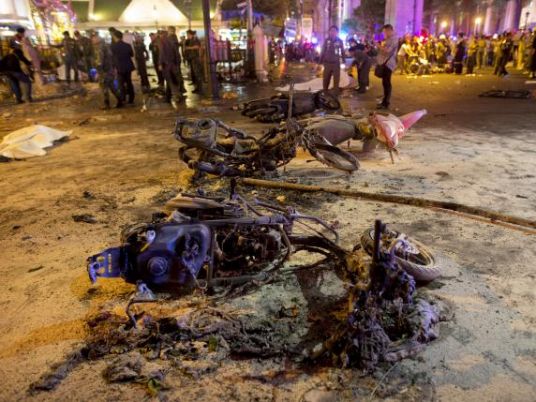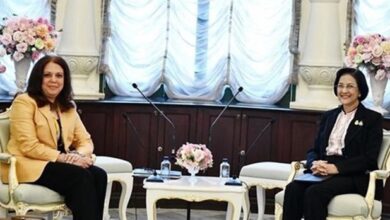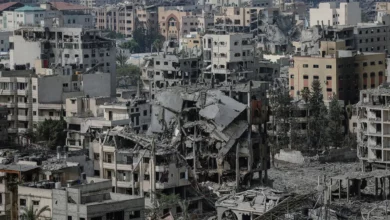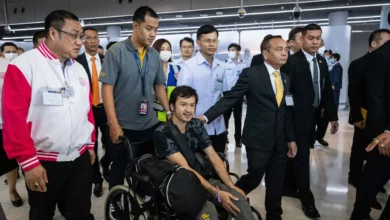
Thai police said on Wednesday they had still not established the nationality or whereabouts of the man they suspect bombed a Bangkok shrine, killing at least 20 people, suggesting the trail had gone cold after he was captured by CCTV at the scene.
Authorities said they were keeping watch for the suspect at the country's borders, but police chief Somyot Pumpanmuang told a news conference that it was not clear how many people were involved in the attack or if they were still in the country.
"I don't suspect one person, I suspect many people," he said. "I am confident that there are Thais involved but I am not saying it is just Thais or that there are foreigners."
On Tuesday, a day after the bombing at the popular Erawan shrine in the heart of Bangkok, grainy closed-circuit television (CCTV) footage was released showing a young man dumping a backpack at the scene and walking away.
The government says the attack was aimed at wrecking the economy, which depends heavily on tourism.
No one has claimed responsibility for the blast, which according to the latest official toll killed 20 people – more than half of them foreigners from several Asian countries – and wounded more than 120.
Deputy police chief Jaktip Chaijinda said earlier that investigators believed the man on the video resembled a foreigner more than a Thai.
At least two foreigners have been interviewed in connection with the blast, police said.
Jangling nerves in the city on Tuesday, a small explosive was thrown from a bridge towards a river pier, sending a plume of water into the air, but no one was hurt.
A government spokesman initially said there were "patterns" linking the two bombs in that both used the explosive TNT, but police chief Somyot said no direct connection between them had been established.
Police Major General Pornchai Suteerakune, commander of the Institute of Forensic Medicine, said the bodies of almost all those killed at the shrine had wounds inflicted by ball bearings that were packed into the bomb.
The shrine, a blood-spattered scene of charred motorbikes and debris after the blast, was reopened on Wednesday.
No clear tell-tale signs
The footage of the young man with a yellow T-shirt and shaggy dark hair shows him entering the shrine compound with a backpack on, sitting down against a railing and then slipping out of the bag's straps.
He then stands up and walks out apparently holding a mobile phone, leaving the bag by the fence as tourists mill about.
Police spokesman Prawut Thavomsiri said a sketch of the man had been completed and facial recognition technology would be used to try to identify him, but he added that it was possible the suspect was in disguise at the time.
"We believe it is a network and not just one person operating alone. From looking at the CCTV footage we think that the yellow shirt man was maybe operating with one or two other people at the scene," he added, without elaborating.
Prawut had earlier tweeted that police were offering a 1 million baht (US$28,100) reward "to whoever can give information that leads to the arrest of the suspect".
Police have not ruled out any group, including elements opposed to the military government, for the attack, though they say it did not match the tactics of Muslim insurgents in the south or 'red shirt' supporters of the previous administration.
"The attack did not bear the hallmarks of either southern Muslim separatists or red-shirt militants," said Angel Rabasa, an expert on Islamist militancy at the RAND Corporation.
"Both groups have carried out terrorist attacks in the past, but not on this scale in terms of loss of life."
He said the attack could be the work of Islamic State, which has been expanding its reach in Southeast Asia, or an Al-Qaeda-related or independent jihadist group. However, such groups usually claim responsibility for their attacks.
Police said they were also considering the possibility that ethnic Uighurs were behind the bombing.
Thailand forcibly returned 109 Uighurs to China last month.
Hundreds, possibly thousands, of members of the Turkic-speaking and largely Muslim minority have fled unrest in China's western Xinjiang region, where hundreds of people have been killed, prompting a crackdown by Chinese authorities. Many Uighurs have travelled through Southeast Asia to Turkey.
The blast comes at a sensitive time for Thailand, which has been riven for a decade by a sometimes-violent struggle for power between political factions in Bangkok.
A parliament hand-picked by a junta that seized power in a 2014 coup is due to vote on a draft constitution next month. Critics say the draft is undemocratic and intended to help the army secure power and curb the influence of elected politicians.




